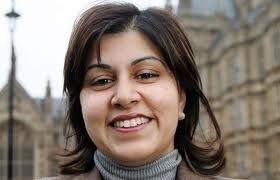A now global crisis - Threats to religious freedom
A now global crisis - · Threats to religious freedom ·
Jan. 10, 2014
 Since taking on my role in 2012 as the first ever UK Minister for faith, I have made the issue of religious freedom a personal priority. The threat to religious freedom, I believe, has become a global crisis. As a result, the UK government has elevated it to a key priority in our human rights work, and, more broadly, we have shown that we understand the huge importance of religion at home and abroad.
Since taking on my role in 2012 as the first ever UK Minister for faith, I have made the issue of religious freedom a personal priority. The threat to religious freedom, I believe, has become a global crisis. As a result, the UK government has elevated it to a key priority in our human rights work, and, more broadly, we have shown that we understand the huge importance of religion at home and abroad.
An illustration of that approach came when I led the largest ever UK ministerial delegation to the Holy See, nearly two years ago. My speech to the Pontifical Ecclesiastical Academy focused on the need for people to feel stronger in their religious identities, more confident in their beliefs - to recognise that accepting and even defending another faith does not diminish your own. Given the continued plight of Christians in the Middle East and beyond, that argument has become more relevant, and the need to heed it more urgent.
The bitterest irony of this persecution - ostracism, discrimination, abuse, forced conversion, torture and even murder - is that it is taking place in a region where Christianity has its roots. Sometimes these cases are examples of collective punishment: people lashing out at Christian minorities in response to events happening many miles away. Other times, a Christian is just a convenient 'other' - a scapegoat.
What is taking place is not acceptable. The UK government is committed to standing up to such persecution, and that requires international political consensus. To that end, last September in New York I convened a second meeting of international leaders to discuss what more politicians can do to promote freedom of religion or belief and fight religious intolerance within our societies. In February I met the Pope of the Coptic Orthodox Church of Alexandria Theodoros II in Cairo and in October I met with Patriarch Gregorios III to discuss the plight of Christians in Syria and I explained our readiness to speak up on behalf of all who are targeted because of their religion or belief.
In all this I believe we should be making a very powerful argument: that not only is religious freedom is a good thing in itself; it is a good thing for economies and societies to progress and flourish. This formed the basis of my speech at Georgetown University last year, when I argued that we must appeal both to states', groups' and individuals' moral obligations, and to their desire for prosperity.
In doing so, we must make sure our approach is not sectarian in itself. Christians defending Christian, Muslims defending Muslims - that will not put a stop to the rising tide of religious persecution. Instead we need a cross-faith response to the problem. That will be the primary focus of an international conference, the first of its kind, which I will be hosting in 2014. As Pope Francis said in Evangelii Gaudium, "interreligious dialogue is a necessary condition for peace in the world, and so it is a duty for Christians as well as other religious communities". History teaches us that we have only defeated intolerance and hatred when we have all come together, whatever the cause. The majority communities need to defend the minorities.
So that is our approach: non-sectarian; promoting the benefits of religious pluralism; demonstrating the fact that accepting and co-existing with another faith is in no way a diminishment of your own faith, but, in fact, the most powerful demonstration of confidence in your beliefs.
Baroness Sayeeda Warsi, british Minister for Faith and Communities


 Votes : 0
Votes : 0









